Front Brake Caliper Replacement Bendix Rail Slider
Removal Procedure
- Apply the parking brake.
- Block the wheels.
- Tilt the cab. Refer to Cab Tilting in General Information.
- Remove about two-thirds of the brake fluid from the master cylinder reservoir.
- Raise and support the vehicle. Refer to Lifting and Jacking the Vehicle in General Information.
- Remove the tire and wheel assembly. Refer to Tire and Wheel Removal and Installation in Tires and Wheels.
- Remove the brake caliper retainer screw (1).
- Remove the brake caliper retainer (3) and the brake caliper spring (2) using a brass punch.
- Compress the pistons, using a C-clamp between the inner brake caliper housing and the outer brake pad.
- If C-clamp is not available. Use screwdrivers in order to pry between the outer brake caliper housing and the outer brake pad.
- While compressing the pistons, watch the reservoir for possible brake fluid overflow. The inner brake pad may stay on the brake caliper mounting plate (Bendix® Caliper).
- Remove the two bolts from the brake caliper flexible hose mounting bracket.
- Disconnect the brake hose from the brake calipers.
- Cap or tape the brake hose fitting in order to prevent contamination.
- Remove the brake caliper.
| • | Do not completely drain the master cylinder reservoir. |
| • | Drain the fluid from the brake caliper bleeder valve. |
| • | Drain the fluid into a suitable container. Discard the fluid. |
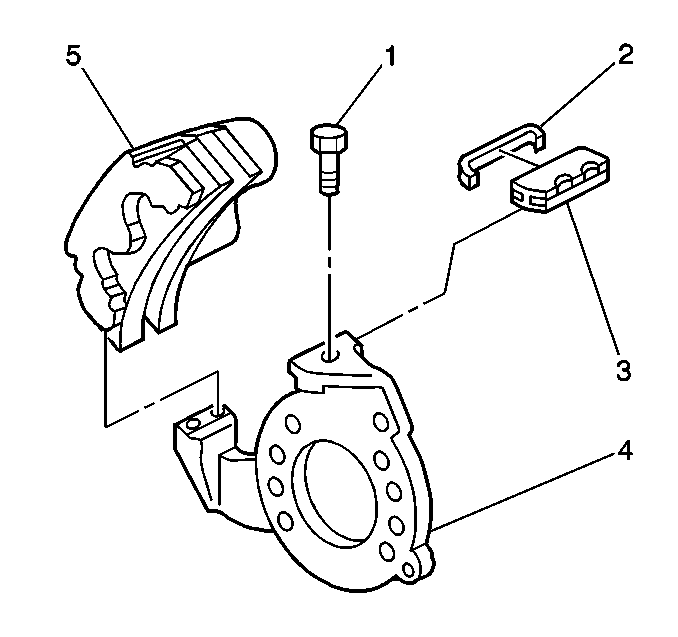
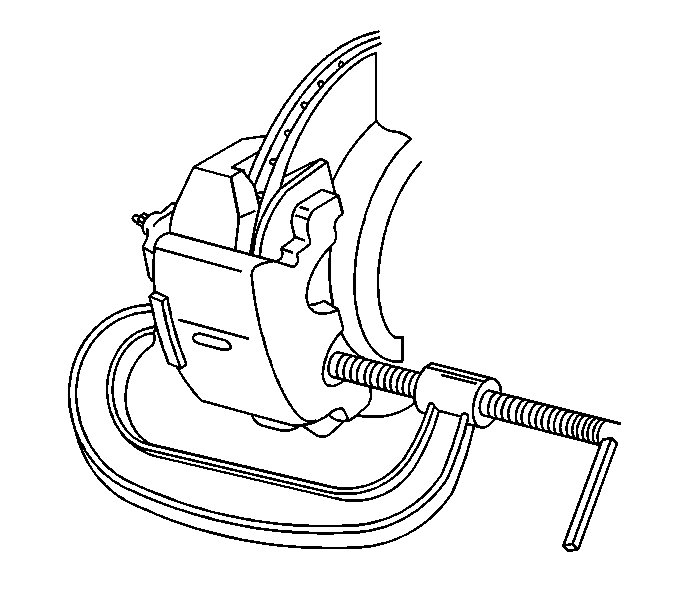
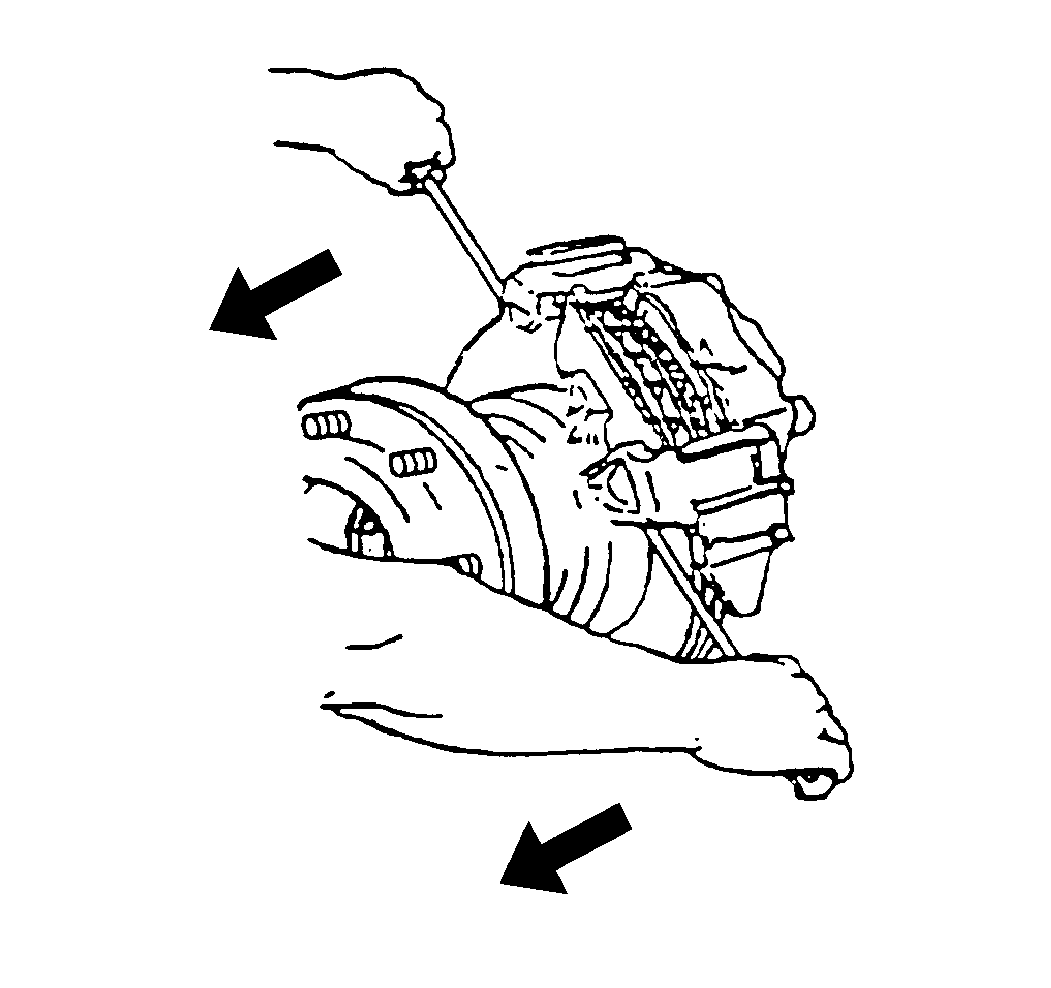
Important:
• Clean the area around the brake hose on the brake caliper with
denatured alcohol or other suitable solvent. • Cap or tape the fitting in order to prevent dirt from entering
the brake hose.
Installation Procedure
- Clean the support rail surfaces of the brake caliper with a wire brush. File smooth any deep nicks or gouges.
- Clean the support rail surfaces of the brake caliper mounting plate with a wire brush. File smooth any deep nicks or gouges.
- Apply a thin coat of brake caliper lubricant to the brake caliper mounting plate support rail surfaces.
- Loosely assemble the brake hose nut to the brake caliper.
- Install the brake caliper.
- Inspect for brake caliper/mounting plate wear. Refer to Brake Caliper/Mounting Plate Wear Adjustment .
- Apply a thin coat of brake caliper lubricant to the brake caliper retainer and the brake caliper spring.
- Tap the brake caliper retainer and brake caliper spring into place using a brass punch and a light weight hammer. The hose in the brake caliper retainer should line up with the threaded hole in the brake caliper mounting plate.
- Install NEW brake caliper retainer bolt (1).
- Lower the cab. Refer to Cab Tilting in General Information.
- Bleed the hydraulic brake system. Refer to Hydraulic Brake System Bleeding in Hydraulic Brakes.
- Pump the brake pedal several times in order to ensure that the pedal is firm and the brake pads are seated.
- Inspect the brake fluid level in the master cylinder. Refer to Master Cylinder Reservoir Filling in Hydraulic Brakes.
- Install the tire and wheel assembly. Refer to Tire and Wheel Removal and Installation in Tires and Wheels.
- Lower the vehicle. Refer to Lifting and Jacking the Vehicle .
- Remove the wheel blocks.
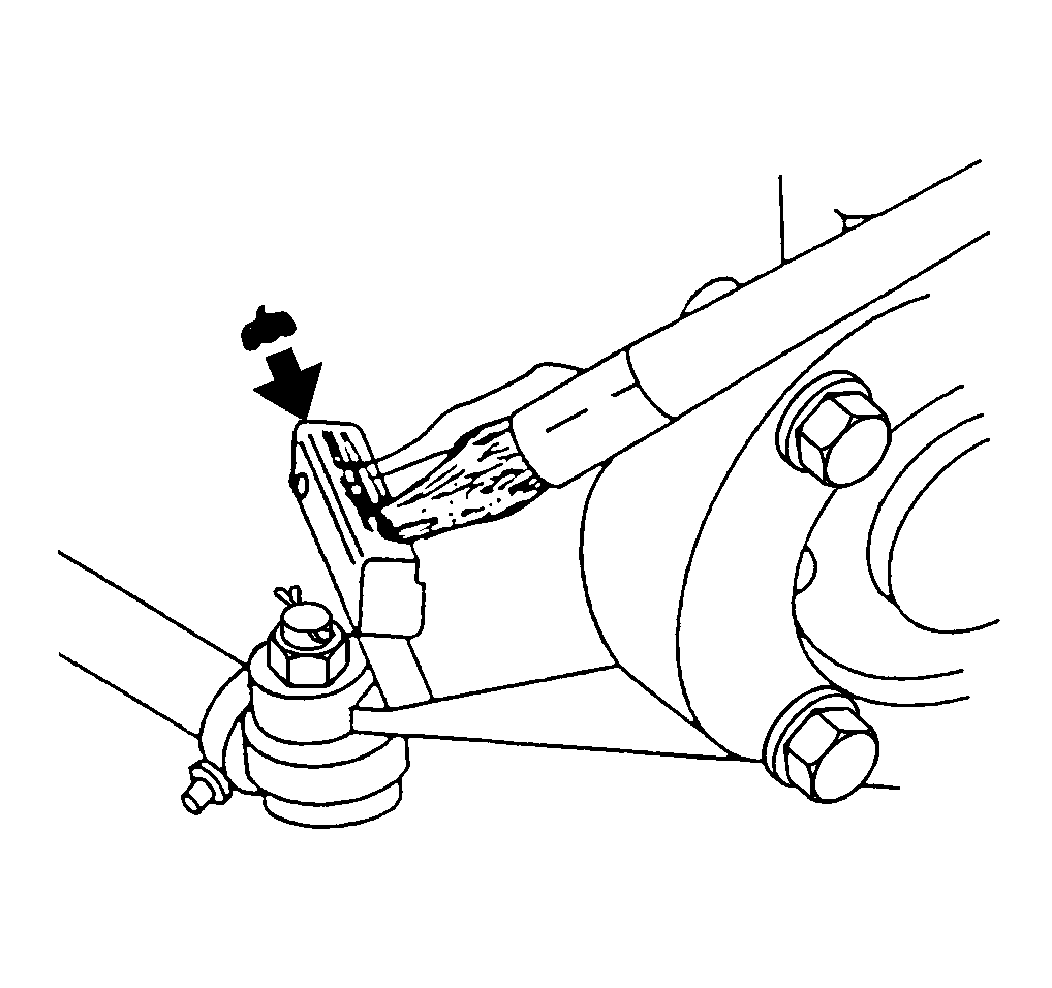
Notice: Use the correct fastener in the correct location. Replacement fasteners must be the correct part number for that application. Fasteners requiring replacement or fasteners requiring the use of thread locking compound or sealant are identified in the service procedure. Do not use paints, lubricants, or corrosion inhibitors on fasteners or fastener joint surfaces unless specified. These coatings affect fastener torque and joint clamping force and may damage the fastener. Use the correct tightening sequence and specifications when installing fasteners in order to avoid damage to parts and systems.
Tighten
| • | Tighten the brake hose nut to 19 N·m (14 lb ft). |
| • | Tighten the brake hose bracket bolts to 32 N·m (24 lb ft). |

Important:
• The brake caliper retainer bolt boss must fit in the circular
hole in the brake caliper retainer. • Do not reuse the brake caliper retainer bolt .
Tighten
Tighten the brake caliper retainer bolt to 40 N·m (29 lb ft).
Important: Check the fluid level in the master cylinder reservoir after pumping the brake pedal.
Front Brake Caliper Replacement Dayton-Walther Rail Slider
Removal Procedure
- Apply the parking brake.
- Block the wheels.
- Remove about 2/3 of the brake fluid from the master cylinder reservoir.
- Raise and support the vehicle. Refer to Lifting and Jacking the Vehicle in General Information.
- Remove the tire and wheel assembly. Refer to Tire and Wheel Removal and Installation in Tires and Wheels.
- Remove the brake caliper retainer bolt (1).
- Remove the brake caliper retainer and brake caliper spring (2) using a brass punch.
- Compress the pistons.
- Use a C-clamp between the inner brake caliper housing and the outer brake pad.
- Inspect the master cylinder for possible brake fluid overflow.
- Disconnect the brake hose.
- Cap or tape the brake hose fitting in order to prevent contamination.
- Remove the brake caliper.
| • | Do not completely drain the master cylinder reservoir. |
| • | Drain the fluid from the brake caliper bleeder valve. |
| • | Drained the fluid into a suitable container. Discard the fluid. |
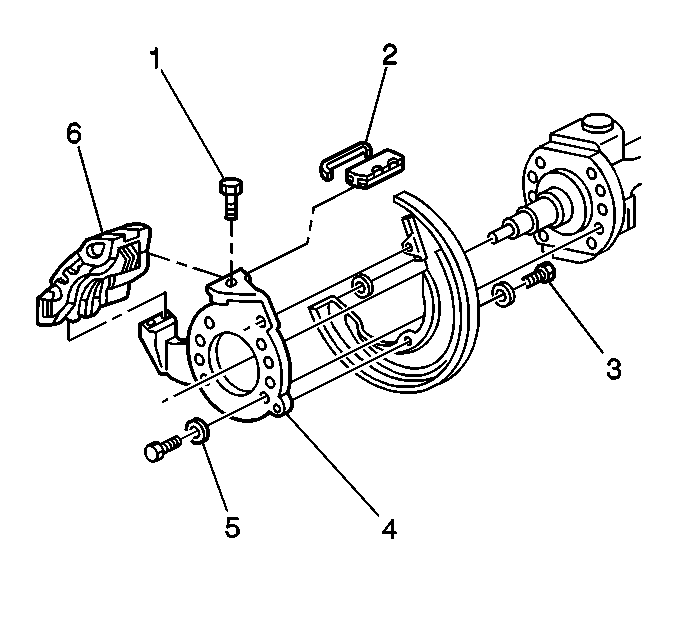

Installation Procedure
- Clean the V-way surfaces of the brake caliper with a wire brush. File smooth any deep nicks or gouges.
- Clean the support rail surfaces of the brake caliper mounting plate with a wire brush. File smooth any deep nicks or gouges.
- Apply a thin coat of brake caliper lubricant to the brake caliper mounting plate support rail surfaces.
- Install the brake hose.
- Apply a thin coat of brake caliper lubricant to the brake caliper retainer and the brake caliper spring.
- Tap the brake caliper retainer and brake caliper spring (2) into place using a brass punch and a light weight hammer. The hose in the brake caliper retainer should line up with the threaded hole in the brake caliper mounting plate (4).
- Install NEW brake caliper retainer bolt.
- Fill the master cylinder reservoir with brake fluid. Refer to Master Cylinder Reservoir Filling in Hydraulic Brakes.
- Bleed the hydraulic brake system. Refer to Hydraulic Brake System Bleeding in Hydraulic Brakes.
- Pump the brake pedal several times in order to ensure that the pedal is firm and the brake linings are seated.
- Inspect the brake fluid level in the master cylinder. Refer to Master Cylinder Reservoir Filling in Hydraulic Brakes.
- Install the tire and wheel assembly. Refer to Tire and Wheel Removal and Installation in Tires and Wheels.
- Lower the vehicle. Refer to Lifting and Jacking the Vehicle in General Information.
- Release the parking brake.
- Remove the wheel blocks.

Notice: Use the correct fastener in the correct location. Replacement fasteners must be the correct part number for that application. Fasteners requiring replacement or fasteners requiring the use of thread locking compound or sealant are identified in the service procedure. Do not use paints, lubricants, or corrosion inhibitors on fasteners or fastener joint surfaces unless specified. These coatings affect fastener torque and joint clamping force and may damage the fastener. Use the correct tightening sequence and specifications when installing fasteners in order to avoid damage to parts and systems.
Loosely assemble the brake hose nut to the brake caliper.
Tighten
| • | Refer to
Notice: Use the correct fastener in the correct location. Replacement fasteners must be the correct part number for that application. Fasteners requiring replacement or fasteners requiring the use of thread locking compound or sealant are identified in the service procedure. Do not use paints, lubricants, or corrosion inhibitors on fasteners or fastener joint surfaces unless specified. These coatings affect fastener torque and joint clamping force and may damage the fastener. Use the correct tightening sequence and specifications when installing fasteners in order to avoid damage to parts and systems. in Caution and Notices. |
| • | Tighten the brake hose nut to 19 N·m (14 lb ft). |

Important:
• The brake caliper retainer bolt boss must fit in the circular
hole in the brake caliper retainer. • Do not reuse the brake caliper retainer bolt .
Tighten
Tighten the brake caliper retainer bolt to 40 N·m (29 lb ft).
